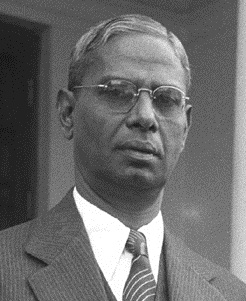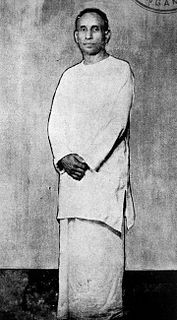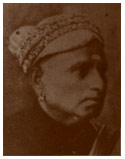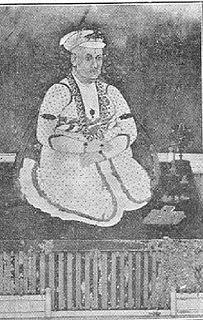Related Research Articles

The Kingdom of Travancore (Thiruvithamkoor) was an Indian kingdom from 1500 until 1949. It was ruled by the Travancore Royal Family from Padmanabhapuram, and later Thiruvananthapuram. At its zenith, the kingdom covered most of modern-day central and southern Kerala with the Thachudaya Kaimal's enclave of Irinjalakuda Koodalmanikkam temple in the neighbouring Kingdom of Cochin, as well as the district of Kanyakumari, now in the Indian state of Tamil Nadu. The official flag of the state was red with a dextrally-coiled silver conch shell at its center. In the early 19th century, the kingdom became a princely state of the British Empire. The Travancore Government took many progressive steps on the socio-economic front and during the reign of Maharajah Sri Chithira Thirunal Balarama Varma, Travancore became the second most prosperous princely state in British India, with reputed achievements in education, political administration, public work and social reforms.

Pattom Thanu Pillai was a participant in the Indian independence movement who later served as the Chief Minister of Kerala from 22 February 1960 to 25 September 1962. He was known as the 'Bhishmacharya' of Kerala politics.

Raja Sir Tanjore Madhava Rao, KCSI, also known as Sir Madhava Rao Thanjavurkar or simply as Madhavarao Tanjavarkar, was an Indian civil servant, administrator and politician who served as the Diwan of Travancore from 1857 to 1872, Indore from 1873 to 1875 and Baroda from 1875 to 1882. He was the nephew of the former Diwan of Travancore T. Venkata Rao and the son of another Ranga Rao.

Sir Ramasamy Chetty Kandasamy Shanmukham ChettyKCIE was an Indian lawyer, economist and politician who served as independent India's first finance minister from 1947 to 1949. He also served as President of India's Central Legislative Assembly from 1933 to 1935 and Diwan of Cochin kingdom from 1935 to 1941.

Ikkanda Warrier (1890–1977) was the first and the last Prime Minister of the state of Cochin, India, beginning in 1948.

Diwan Bahadur Sir Perungavur Rajagopalachari, KCSI, CIE, also spelt in contemporary records as Sir P. Rajagopala Achariyar, was an Indian administrator. He was the Diwan of Cochin State from December 1896 to August 1901 and of Travancore from 1906 to 1914.

S. Shungrasoobyer (1836–1904), also known as Sankara Subha Iyer, was an Indian administrator who served as the Diwan of Travancore State from 1892 to 1898.
Sir George Townsend BoagKCIECSI (1884–1969) was a British Indian civil servant, statistician and administrator who served as the Acting Governor of Odisha from 11 August 1938 to 8 December 1938.

Rai Raya Rai Venkata Rao, was an Indian administrator and statesman who served as Diwan of Travancore 1821–1829 and 1838–39. He was the father of R. Raghunatha Rao and paternal uncle of Sir T. Madhava Rao.
Reddy Row, also known as Venkata Row, was an Indian administrator who served as the Diwan of Travancore from 1817 to 1821 and 1843 to 1845.

Diwan Bahadur Rai Raghunatha RaoCSI was an Indian civil servant, administrator, politician and Indian independence activist who served as the Diwan of Indore from 1875 to 1880 and 1886 to 1888. He was related to Indian statesman Sir T. Madhava Rao.
Ravi Varma IV was an Indian monarch who ruled the Kingdom of Cochin from 1853 to 1864.
Sir Albion Rajkumar BanerjeeCSI CIE was an Indian civil servant and administrator who served as the Diwan of Cochin from 1907 to 1914, Diwan of Mysore kingdom from 1922 to 1926 and as Prime Minister of Kashmir from 1927 to 1929.
Diwan Bahadur Sir Thiruvalayangudi VijayaraghavacharyaKBE was an Indian civil servant and administrator who served as the Diwan of Cochin kingdom from 1919 to 1922. Vijayaraghavacharya was also a member of the Constituent Assembly of India representing Udaipur.
Diwan Bahadur Cherubala Pathayapura Karunakara Menon (1891–1976) was an Indian civil servant and administrator who served as the Diwan of Cochin kingdom from 1944 to 1947. He was the last Diwan of the kingdom and served till its accession to the Indian Union.
Diwan Bahadur Nemali Pattabhirama Rao Pantulu was an Indian civil servant and administrator who served as the Diwan of Cochin kingdom from 1902 to 1907.
Dewan Bahadur / Diwan Bahadur was a title of honor awarded during British Raj. It was awarded to individuals who had performed great service to the nation. It was an equivalent of the "Civil Division" of the British Order of the Bath. The title was accompanied by a medal called a Title Badge. Dewan literally means Prime Minister in Indian context and Bahadur means brave.
References
- Roots, genesis of socio-economic development of modern India. Voluntary Health Association of India. 2002. p. 14.